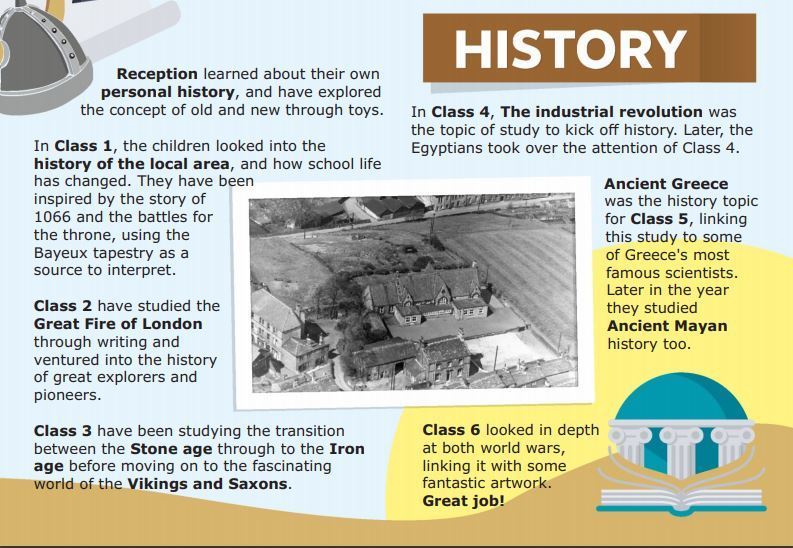History
Coordinator Mr G HobsonAt Netherthong Primary School our vision is to provide quality teaching and learning of humanities. We aim that children will develop an awareness of their own and the wider environments, learn about others’ lives and lifestyles and develop a knowledge of significant men, women, children and events.
A broad humanities programme helps to promote:
Successful learners – we want children to be enthusiastic about learning, keen to do their best and willing to engage in new experiences;
Confident individuals – through an understanding of the past, the environment and others’ values and beliefs, children can develop self-respect and a desire to achieve personal goals. They learn to live independently and get on well with others.
Responsible citizens – we encourage respect for others and participation in school and community life. Children use what they have learnt to make informed choices and safe decisions.
History should inspire a curiousity in young people. They should want to know more about the past, what people's lives were like, significant events that shaped periods of history and legacies that can still be seen today. At Netherthong, our history curriculum has been designed to not only inspire students, but enable them to argue, debate, question and weigh up evidence in a historical context. We intend to explore not only Britain's turbulent past, but that of the wider world too. Pupils will develop appropriate subject knowledge, skills and understanding as set out in the national curriculum history programmes of study. Our aims are to fulfil the requirements of the National Curriculum for history; providing a broad, balanced and adaptive curriculum.
The history of Britain commences in the earliest times and stretches up to the present day, We want pupils to have coherent and chronological understanding of these island's history and how Britain has influenced and been influenced by the wider world. We want pupils to understand the complexity of people’s lives, the process of change, the diversity of societies and relationships between different groups, as well as their own identity and the challenges of their time.
Students follow a carefully constructed history curriculum that provides a wide range of learning. Coverage will explore the local history that has affected the people and area in which we live as well as the wider global history of civilisations, monarchs, empires and conflicts.
In line with the National Curriculum requirements, teaching of is sequenced from Reception to Year 6 and is detailed on a curriculum map. As History has connections to other subjects across the curriculum, children have the opportunity to explore and question at greater depth, enriching the curriculum and encouraging greater engagement. A variety of resources and engaging enquiry-based activities are used to create an environment which fires children’s curiosity about the past.
The promotion of a language rich history curriculum is essential to the successful acquisition of knowledge and understanding in history and is planned in our vocabulary maps. The exposure to source materials is important, as through the use of primary and secondary sources, students can exercise personal opinion and interpretation leading to debate and high-level reasoning. The disciplinary knowledge within the subject of history is helpful in giving students the understanding of how historians operate and have to question all interpretations
Here at Netherthong, teachers are guided by subject coordinators and are knowledgeable about what a Netherthong child must know in history. Pupils will be aware of many significant historical events from different times and have understanding of how these events have impacted on global change and progress.
Pupils retain knowledge that is central to history through exposure to historical vocabulary and regular quizzes to encourage long term memory (Year 1 - 6).
Children will work collaboratively to solve problems and explain the processes that they have studied or observed and delve into different sources to support the area of study. At the end of each topic, children will have broadened their own vocabularies within the context of the topic. Marking and feedback will inform the teacher of understanding or misconceptions that can be addressed throughout the unit of study.
Monitoring takes place within school. The history coordinator will ensure that that a broad range of history takes place in line with the National Curriculum. The coordinator will use of lesson observations to gain a window into teaching and learning, use pupil voice to find out what students know and how they have progressed in history. The coordinator will use planning and book looks and subject assessments to manage the delivery of history and measure the impact of the current curriculum.
Beyond Netherthong Primary School, students will go on to Key Stage 3 ready with skills that will be developed further. Children will act as good citizens within their local community and as historians, students will learn lessons from history to influence the decisions they make in their lives in the future.
http://www.bbc.co.uk/education/subjects/zcw76sg
This is the main BBC website for key stage 2 history, which has lots of useful information and videos about many topics covered in school.
http://www.bbc.co.uk/education/subjects/zkqmhyc
This is the key stage 1 section of the BBC website for history. It is usefully organised into periods of history as well as themes throughout history. This is really useful for helping children understand chronology!
http://www.ngkids.co.uk/history#
The organisation of this website can be frustrating if you are looking for a specific area of history, however it is great if you want to just have a casual browse, using the ‘cool clicks’ and the ‘what’s popular’ sections.
http://www.bbc.co.uk/cbbc/shows/horrible-histories
CBBC have done a great job of bringing history to life through Horrible Histories. Full episodes are available from the link above. Many episodes focus on themes across history as well as other episodes that look at specific eras.




